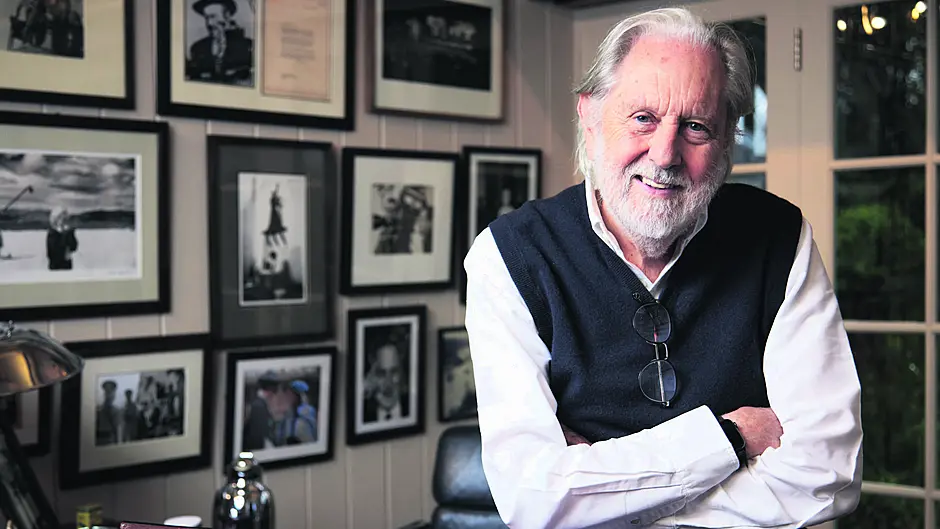There has never been a better time to start learning whatever it is that you’ve always yearned to know more about, education advocates tell MARY McCARTHY
IN the past, being ‘self-taught’ was about studying the collective wisdom of previous generations and learning how to think for yourself. ‘It was by complete chance that I discovered that I loved work and loved learning,’ explained David Puttnam, a former member of the UK House of Lords, award-winning film producer, and founder of Atticus Education, who lives in Skibbereen.
‘In post-war Britain, after leaving school at 16 with only three ‘O’ levels, I realised that going to night school and creating my own curriculum was my best shot at enhancing my employability,’ he said.
‘I studied nine subjects over a period of four years at four different colleges in London. I wanted to differentiate myself from the other boys in the dispatch department at the advertising agency where I worked as a messenger. I travelled in and out of town every day on the Piccadilly Line, reading mostly non-fiction sociology in an effort to better understand people, and how to shift consumer tastes.’
After a couple of years, his interest in learning was noticed at the company and they took a chance on David as the first non-graduate placed on their graduate training programme.
‘It gave me the opportunity to begin to apply what I’d been reading. One book that made an early impression on me was The Hidden Persuaders by Vance Packard.’
He believes he was very lucky, all this came at a point when things were changing in Britain, he noted. ‘There had been a surge in the spending power of young people. My role in the agency was to communicate with people my age, making ads that appealed to my own generation. Once I felt I’d done everything that interested me in advertising, my instinct was – what next?’ He wanted a fresh challenge, and something he could excel at.
‘The first film I produced was Melody, which for reasons I’ve never fully understood, became a huge success in Japan! That allowed me to produce a few more films.’.
‘That’ll Be the Day, my third film, was a solid success, as was its sequel Stardust. These led to Bugsy Malone, Midnight Express, Chariots of Fire, Local Hero, The Killing Fields and The Mission.’
‘I remember my father once saying that if I decided to become a coal miner, I had to promise him I’d try to be one of the greatest coal miners in the world,’ he said. ‘Simply by being the best and fastest messenger I’d developed sufficient self-confidence to pit myself against other challenges. In a sense these were the very things I hadn’t been encouraged to do at school. Looking back, the highly structured, low expectation world of Britain in the 1950s worked well for me – it gave me something to kick against.’
‘Also, marrying young and immediately having family commitments necessitated putting in long hours, which in turn made me appear more serious about my work than many of my contemporaries,’ said David.
The one thing he wished he’d paid more attention to was a better understanding of philosophy.
‘I think I would have benefited from understanding more about Plato, Cicero, and Socrates. But they didn’t teach that kind of thing at my school. The encouragement, and sometimes the “tough love” I received at work was enormously helpful,’ he recalled.
‘I eventually joined an agency where I found the competition far more fierce than I’d expected. I went to my boss, a man named Colin Millard, to admit that I was struggling. I didn’t get a lot of sympathy – “You are here to amaze me - start amazing me, and you’ll do fine,” he told me.
He made it very clear where the bar was set. From him I learned that competence was a point of departure, and not a point of arrival.’
‘At night school I found that I was good at asking questions. That’s led to a lifetime of seeking the best possible advice, and learning as much as I can from others. I’ve been very lucky in life, but I’ve also been very tenacious.’
Education in its truest form has never been more important, he believes.
‘At Atticus here in Skibbereen, my role is to teach cinema and television, and the philosophy that lies behind the choices we make.’
David thinks we would all do well to look more carefully at why Steve Jobs and Bill Gates dropped out of college, yet were responsible for the quite extraordinary breakthroughs that have affected all of our lives since.
‘Traditional education does not encourage their type of restless mind, the type that brings about real change. It strikes me as something of a contradiction that so many highly tutored minds tend to acknowledge conventions of thought, rather than seeking to challenge them.’
Prof Des MacHale, emeritus professor of mathematics at UCC, believes that to be ‘learned’, one’s education must have a strong component of being self-taught, as all the great minds of humanity have had.
‘Very few selftaught people have existed throughout history. It is likely that inspired by their parents and teachers, they were given the confidence to innovate and push forward the boundaries in new areas. Good examples from West Cork include Percy Ludgate, who designed the second analytical engine (a general-purpose computer) in history and the Clerke sisters, Ellen and Agnes, pioneers in astronomy.’
The self-taught try harder, he believes, and rely more on their own resources. In school, with teachers, students must follow the curriculum, but self-taught students either have no curriculum or create their own curriculum. Those taught in a structured way are surrounded by people who think like them, and all thinking alike leads to conformity – so they are less likely to be innovative.
‘There has rarely been a better time to be self-taught than this information age,’ he concluded.
‘The internet, along with books, especially second- hand, remain fairly cheap sources of information on every subject under the sun – this is still where real learning resides. The internet, properly used, is the greatest information resource ever invented, but can be shallow and riddled with misinformation. Education can be expensive, but ignorance is much more expensive in the long run.’










